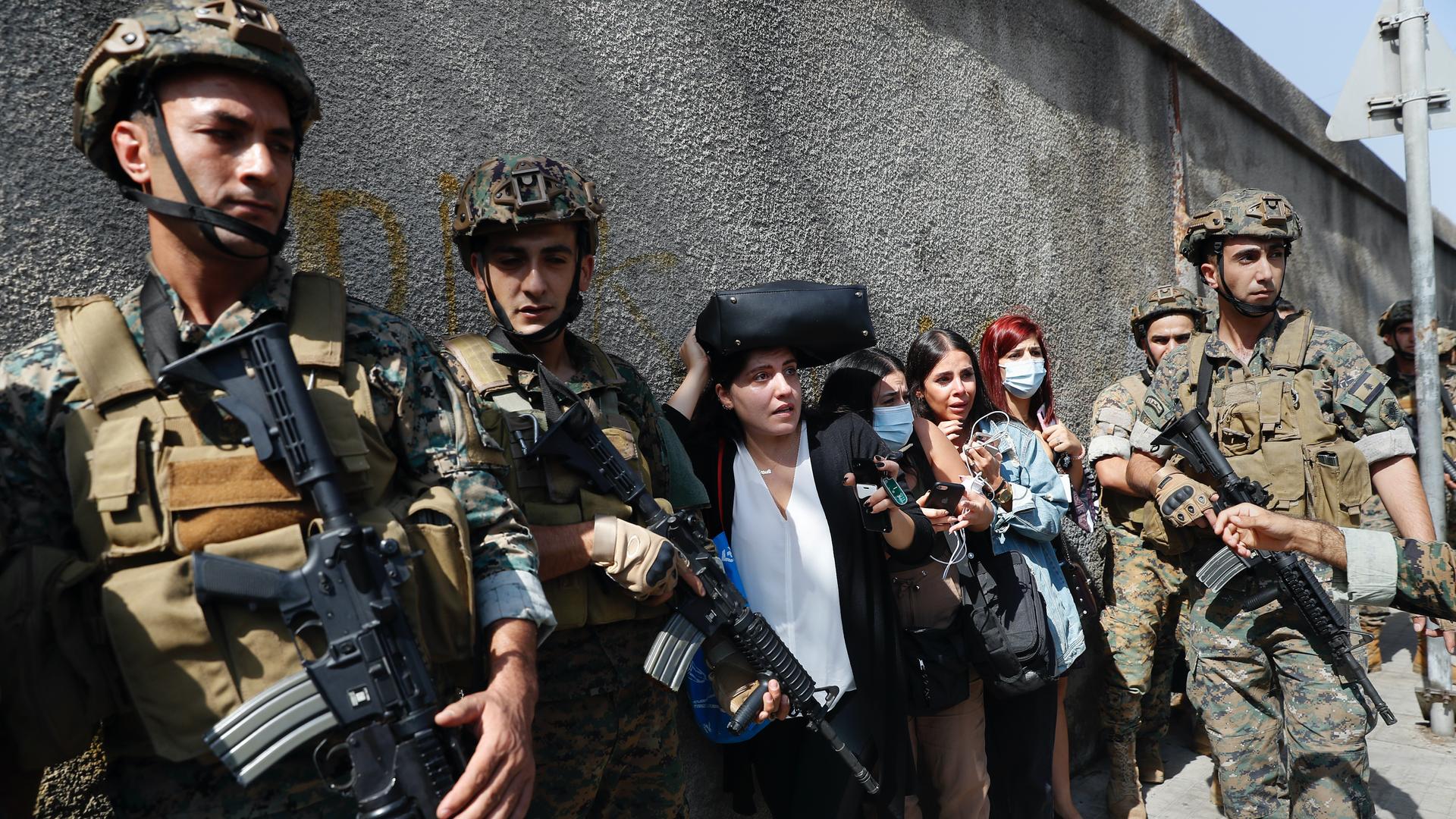Residents of the Tayouneh neighborhood in Beirut have been picking up the pieces from last week’s violent clashes.
Videos showed store owners sweeping broken glass and surveying the damage.
Protests organized by the Shiite Hezbollah and Amal movements turned violent last Thursday when gunmen started firing. Photos from the scene showed some of those who were taking part carrying rocket-propelled grenades.
Related: Lebanon’s crisis has gone from bad to worse. But is anyone listening?
At least seven people were killed.
For some, the scenes of bloodshed on the streets of Beirut are a grim reminder of Lebanon’s 15-year civil war. And now, those words — civil war — have once again entered Lebanese political discourse.
On Monday, Hezbollah leader Hassan Nasrallah gave a televised speech in which he accused the rival group, Lebanese Forces, of attempting to start a new civil war.
He said Hezbollah’s armed wing has 100,000 fighters. That number has not been independently verified.
Nasrallah was trying to tamp down tensions, said Christophe Abi-Nassif, director of the Lebanon Program at the Middle East Institute in Washington.
“But despite this appeasement, [Nasrallah] also drew these very clear, distinct red lines, particularly to the Lebanese Forces, which were on the flip side of these clashes — to kind of draw a line in the sand, saying, ‘Hey, we do not want a civil war, but at the same time, do not test us.’”
“But despite this appeasement, [Nasrallah] also drew these very clear, distinct red lines, particularly to the Lebanese Forces, which were on the flip side of these clashes — to kind of draw a line in the sand, saying, ‘Hey, we do not want a civil war, but at the same time, do not test us,’” he said.
Related: Lebanon’s political class ‘ripped off’ the country’s potential, ‘Pandora’ investigator says
At the heart of these recent clashes is an investigation into the blast that ripped through the Beirut port on Aug. 4, 2020. Human Rights Watch described it as the largest nonnuclear explosion in history.
That day, several tons of ammonium nitrate, a chemical used in fertilizers and carelessly stored at the Beirut port, exploded, leveling whole neighborhoods of the capital; 218 people died and thousands were injured.
Lebanese officials promised a swift and thorough investigation. But the process has been far from that.
A major reason for the delay is the constant pushback from Lebanon’s different political factions about who should lead the investigation.
Right now, it’s judge Tarek Bitar. But Hezbollah and its allies want him out.
“They accuse him of only targeting people from a certain political line, and we’re starting to hear really big statements accusing him of standing against the Resistance, against Hezbollah, standing with the Americans, standing with the Western nations, a lot of accusations that in my view are at this point not substantiated enough,” said Halim Shebaya, executive director at the Arab Association of Constitutional Law in Lebanon.
Bitar has focused on senior political and security officials like former Minister of Interior Nohad Machnouk. He is the second judge appointed to the port explosion investigation. The first one, Judge Fadi Sawan, was also pressured to resign.
Related: Riots in Lebanon as West calls for quick Cabinet formation
“So, at this point, it’s really getting a bit ridiculous in the sense that one cannot remove a judge every time we don’t like them.”
“So, at this point, it’s really getting a bit ridiculous in the sense that one cannot remove a judge every time we don’t like them,” Shebaya said.
Political analyst Bachar El-Halabi thinks the motives are clear.
Related: Mired in crises, Lebanon marks 1 year since horrific blast
“Their intent is to put an end to this investigation out of fear that its arrows might hit Hezbollah or its allies,” Halabi said.
He added that a culture of impunity has long impeded any real accountability in Lebanon. Threats and intimidation are aimed at Bitar for now, but will likely continue no matter who is in charge of the investigation.
Tensions are rising at a time when Lebanon is also facing an economic crisis. There are fuel shortages and food prices have skyrocketed.
For many inside the country, the investigation into the port explosion is a litmus test of whether the country can begin to hold the powerful accountable.
Our coverage reaches millions each week, but only a small fraction of listeners contribute to sustain our program. We still need 224 more people to donate $100 or $10/monthly to unlock our $67,000 match. Will you help us get there today?
